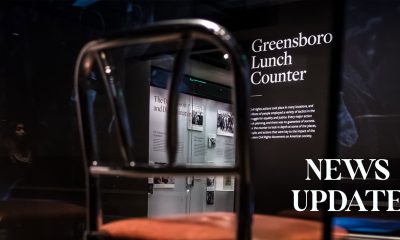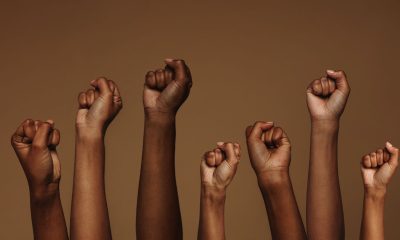Community
U.C. Berkeley Professor Sheds Light on Gun Violence as a Public Health Issue
Last month, after years of debate, U.S. Surgeon General Vivek Murthy declared gun violence an urgent public health crisis and released an extraordinary report outlining its devastating consequences. Murthy’s 32-page advisory is the first federal government report to fully acknowledge the health impacts of gun violence on Americans, whether they are direct victims, families, and friends of victims, or live in communities that face ongoing street violence or have experienced a mass shooting.

By Elinor Simek
UC Berkeley News
Last month, after years of debate, U.S. Surgeon General Vivek Murthy declared gun violence an urgent public health crisis and released an extraordinary report outlining its devastating consequences.
Murthy’s 32-page advisory is the first federal government report to fully acknowledge the health impacts of gun violence on Americans, whether they are direct victims, families, and friends of victims, or live in communities that face ongoing street violence or have experienced a mass shooting.
To Jason Corburn, a professor at UC Berkeley School of Public Health, gun violence has always been a public health issue, and he has just finished teaching students at Berkeley School of Public Health how to address it as one.
The class, “Urban Gun Violence Prevention: A Public Health Perspective,” was Berkeley Public Health’s first course dedicated to addressing urban gun violence.
“Regardless of where you stand on guns, there is no doubt that gun violence is a key contributor to disability, injury and of death for Americans,” said Corburn. “Gun violence is both a source of trauma and stress and a response to unaddressed traumas. Urban gun violence is a community health equity issue, since Black and Brown youth, men under 35 years old, and hyper-segregated neighborhoods are most likely to experience firearm violence.
“Yet, this is also a population and place issue, because the impacts of firearm violence can also affect others in the community, regardless of direct or witnessed experience,” Corburn said.
Firearm-related injuries, such as suicides and homicides, are the No. 1 cause of death for children and adolescents (ages 1 to 19) in the U.S., with the heaviest burden disproportionately falling on the Black community. Homicide is the No. 1 cause of death for Black men under 44 years-old in the U.S.
Urban gun violence is sometimes called “street violence” or “community gun violence,” and is defined as violence in public spaces between individuals who do not know each other intimately. It’s distinct from domestic violence, mass shootings, or suicide.
“By offering this course, I wanted to bring attention to today’s urban gun violence epidemic,” Corburn said. “While this type of violence is often overlooked compared to the bigger headlines of mass shootings, urban gun violence is ongoing, harming the same communities over and over again.”
Corburn, a joint professor in the Department of City and Regional Planning, taught the class with Joe Griffin and DeVone Boggan. Griffin, who received his MPH and DrPH from Berkeley Public Health, is executive director of Youth ALIVE!, an Oakland-based nonprofit organization that works to reduce violence.
Boggan, also a UC Berkeley grad, is chief executive of Advance Peace and former director of Richmond’s Office of Neighborhood Safety (ONS). Corburn has worked in partnership with Richmond’s ONS and Advance Peace since 2007.
The class was structured as a seminar which combined readings, videos, and discussions with researchers and practitioners. Anchoring the course was a review of structural racism in America and how specific policies, such as redlining, dehumanizing policing, and environmental injustices, create the social, spatial and institutional conditions for gun violence.
Ten students from Berkeley Public Health and City and Regional Planning participated. The instructors co-facilitated class each week, along with students who gave presentations.
Each class also hosted a guest speaker from leading research and governmental organizations around the country. The guests, many of whom had firsthand experiences with gun violence, led students in discussions of street outreach, participant engagement, hospital-based interventions, the role of media and other potential solutions to urban gun violence.
Among the speakers was Greg Jackson, deputy director of the first White House Office of Gun Violence Prevention, created in 2023. Other guests included Abené Clayton, a journalist who is part of The Guardian’s Guns and Lies in America project; David Muhammad, executive director of the National Institute for Criminal Justice Reform, Dr. Shani Buggs and Dr. Kravitz-Wirtz from UC Davis’s Violence Prevention Research Program; and Sam Vaughn, director of Richmond’s Office of Neighborhood Safety (ONS); among others.
Inspiring students
“The class was an amazing opportunity to learn of the cutting edge research within the gun violence prevention field,” said Ricardo Sarmiento, who graduated from UC Berkeley in May with an MPH in Health Policy & Management. “The guests that were invited had their finger on the pulse of the community.
“The class used the lenses of public health, city planning, policy advocacy, and community organizing,” Sarmiento said. “The presenters all provided different approaches to reduce gun violence.”
Activism
Gov. Newsom Approves $170 Million to Fast Track Wildfire Resilience
AB 100 approves major investments in regional conservancies across the state, including over $30 million each for the Sierra Nevada, Santa Monica Mountains, State Coastal, and San Gabriel/Lower LA Rivers and Mountains conservancies. An additional $10 million will support wildfire response and resilience efforts.

By Bo Tefu
California Black Media
With wildfire season approaching, last week Gov. Gavin Newsom signed Assembly Bill (AB) 100, unlocking $170 million to fast-track wildfire prevention and forest management projects — many of which directly protect communities of color, who are often hardest hit by climate-driven disasters.
“With this latest round of funding, we’re continuing to increase the speed and size of forest and vegetation management essential to protecting communities,” said Newsom when he announced the funding on April 14.
“We are leaving no stone unturned — including cutting red tape — in our mission to ensure our neighborhoods are protected from destructive wildfires,” he said.
AB 100 approves major investments in regional conservancies across the state, including over $30 million each for the Sierra Nevada, Santa Monica Mountains, State Coastal, and San Gabriel/Lower LA Rivers and Mountains conservancies. An additional $10 million will support wildfire response and resilience efforts.
Newsom also signed an executive order suspending certain regulations to allow urgent work to move forward faster.
This funding builds on California’s broader Wildfire and Forest Resilience Action Plan, a $2.7 billion effort to reduce fuel loads, increase prescribed burning, and harden communities. The state has also launched new dashboards to keep the public informed and hold agencies accountable.
California has also committed to continue investing $200 million annually through 2028 to expand this effort, ensuring long-term resilience, particularly in vulnerable communities.
Activism
California Rideshare Drivers and Supporters Step Up Push to Unionize
Today in California, over 600,000 rideshare drivers want the ability to form or join unions for the sole purpose of collective bargaining or other mutual aid and protection. It’s a right, and recently at the State Capitol, a large number of people, including some rideshare drivers and others working in the gig economy, reaffirmed that they want to exercise it.

By Antonio Ray Harvey
California Black Media
On July 5, 1935, President Franklin D. Roosevelt signed into federal law the National Labor Relations Act (NLRA). Also known as the “Wagner Act,” the law paved the way for employees to have “the right to self-organization, to form, join, or assist labor organizations,” and “to bargain collectively through representatives of their own choosing, according to the legislation’s language.
Today in California, over 600,000 rideshare drivers want the ability to form or join unions for the sole purpose of collective bargaining or other mutual aid and protection. It’s a right, and recently at the State Capitol, a large number of people, including some rideshare drivers and others working in the gig economy, reaffirmed that they want to exercise it.
On April 8, the rideshare drivers held a rally with lawmakers to garner support for Assembly Bill (AB) 1340, the “Transportation Network Company Drivers (TNC) Labor Relations Act.”
Authored by Assemblymembers Buffy Wicks (D-Oakland) and Marc Berman (D-Menlo Park), AB 1340 would allow drivers to create a union and negotiate contracts with industry leaders like Uber and Lyft.
“All work has dignity, and every worker deserves a voice — especially in these uncertain times,” Wicks said at the rally. “AB 1340 empowers drivers with the choice to join a union and negotiate for better wages, benefits, and protections. When workers stand together, they are one of the most powerful forces for justice in California.”
Wicks and Berman were joined by three members of the California Legislative Black Caucus (CLBC): Assemblymembers Tina McKinnor (D-Inglewood), Sade Elhawary (D-Los Angeles), and Isaac Bryan (D-Ladera Heights).
Yvonne Wheeler, president of the Los Angeles County Federation of Labor; April Verrett, President of Service Employees International Union (SEIU); Tia Orr, Executive Director of SEIU; and a host of others participated in the demonstration on the grounds of the state capitol.
“This is not a gig. This is your life. This is your job,” Bryan said at the rally. “When we organize and fight for our collective needs, it pulls from the people who have so much that they don’t know what to do with it and puts it in the hands of people who are struggling every single day.”
Existing law, the “Protect App-Based Drivers and Services Act,” created by Proposition (Prop) 22, a ballot initiative, categorizes app-based drivers for companies such as Uber and Lyft as independent contractors.
Prop 22 was approved by voters in the November 2020 statewide general election. Since then, Prop 22 has been in court facing challenges from groups trying to overturn it.
However, last July, Prop 22 was upheld by the California Supreme Court last July.
In a 2024, statement after the ruling, Lyft stated that 80% of the rideshare drivers they surveyed acknowledged that Prop 22 “was good for them” and “median hourly earnings of drivers on the Lyft platform in California were 22% higher in 2023 than in 2019.”
Wicks and Berman crafted AB 1340 to circumvent Prop 22.
“With AB 1340, we are putting power in the hands of hundreds of thousands of workers to raise the bar in their industry and create a model for an equitable and innovative partnership in the tech sector,” Berman said.
Activism
California Holds the Line on DEI as Trump Administration Threatens School Funding
The conflict began on Feb. 14, when Craig Trainor, acting assistant secretary for civil rights at the U.S. Department of Education (DOE), issued a “Dear Colleague” letter warning that DEI-related programs in public schools could violate federal civil rights law. The letter, which cited Title VI of the Civil Rights Act and the 2023 Supreme Court ruling in Students for Fair Admissions v. Harvard, which ended race-conscious admissions, ordered schools to eliminate race-based considerations in areas such as admissions, scholarships, hiring, discipline, and student programming.

By Joe W. Bowers Jr
California Black Media
California education leaders are pushing back against the Trump administration’s directive to dismantle diversity, equity, and inclusion (DEI) programs in its K-12 public schools — despite threats to take away billions in federal funding.
The conflict began on Feb. 14, when Craig Trainor, acting assistant secretary for civil rights at the U.S. Department of Education (DOE), issued a “Dear Colleague” letter warning that DEI-related programs in public schools could violate federal civil rights law. The letter, which cited Title VI of the Civil Rights Act and the 2023 Supreme Court ruling in Students for Fair Admissions v. Harvard, which ended race-conscious admissions, ordered schools to eliminate race-based considerations in areas such as admissions, scholarships, hiring, discipline, and student programming.
According to Trainor, “DEI programs discriminate against one group of Americans to favor another.”
On April 3, the DOE escalated the pressure, sending a follow-up letter to states demanding that every local educational agency (LEA) certify — within 10 business days — that they were not using federal funds to support “illegal DEI.” The certification requirement, tied to continued federal aid, raised the stakes for California, which receives more than $16 billion annually in federal education funding.
So far, California has refused to comply with the DOE order.
“There is nothing in state or federal law that outlaws the broad concepts of ‘diversity,’ ‘equity,’ or ‘inclusion,’” wrote David Schapira, California’s Chief Deputy Superintendent of Public Instruction, in an April 4 letter to superintendents and charter school administrators. Schapira noted that all of California’s more than 1,000 traditional public school districts submit Title VI compliance assurances annually and are subject to regular oversight by the state and the federal government.
In a formal response to the DOE on April 11, the California Department of Education, the State Board of Education, and State Superintendent of Public Instruction Tony Thurmond collectively rejected the certification demand, calling it vague, legally unsupported, and procedurally improper.
“California and its nearly 2,000 LEAs (including traditional public schools and charter schools) have already provided the requisite guarantee that its programs and services are, and will be, in compliance with Title VI and its implementing regulation,” the letter says.
Thurmond added in a statement, “Today, California affirmed existing and continued compliance with federal laws while we stay the course to move the needle for all students. As our responses to the United States Department of Education state and as the plain text of state and federal laws affirm, there is nothing unlawful about broad core values such as diversity, equity and inclusion. I am proud of our students, educators and school communities who continue to focus on teaching and learning, despite federal actions intended to distract and disrupt.”
California officials say that the federal government cannot change existing civil rights enforcement standards without going through formal rule-making procedures, which require public notice and comment.
Other states are taking a similar approach. In a letter to the DOE, Daniel Morton-Bentley, deputy commissioner and counsel for the New York State Education Department, wrote, “We understand that the current administration seeks to censor anything it deems ‘diversity, equity & inclusion.’ But there are no federal or State laws prohibiting the principles of DEI.”
-

 Activism4 weeks ago
Activism4 weeks agoOakland Post Endorses Barbara Lee
-

 Activism4 weeks ago
Activism4 weeks agoOakland Post: Week of April 2 – 8, 2025
-

 #NNPA BlackPress3 weeks ago
#NNPA BlackPress3 weeks agoTrump Profits, Black America Pays the Price
-

 Activism2 weeks ago
Activism2 weeks agoOakland Post: Week of April 9 – 15, 2025
-

 #NNPA BlackPress3 weeks ago
#NNPA BlackPress3 weeks agoHarriet Tubman Scrubbed; DEI Dismantled
-

 #NNPA BlackPress3 weeks ago
#NNPA BlackPress3 weeks agoTrump Targets a Slavery Removal from the National Museum of African-American History and Culture
-

 #NNPA BlackPress3 weeks ago
#NNPA BlackPress3 weeks agoNew York Stands Firm Against Trump Administration’s Order to Abandon Diversity in Schools
-

 #NNPA BlackPress4 weeks ago
#NNPA BlackPress4 weeks agoLawmakers Greenlight Reparations Study for Descendants of Enslaved Marylanders


























































